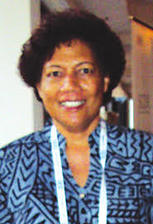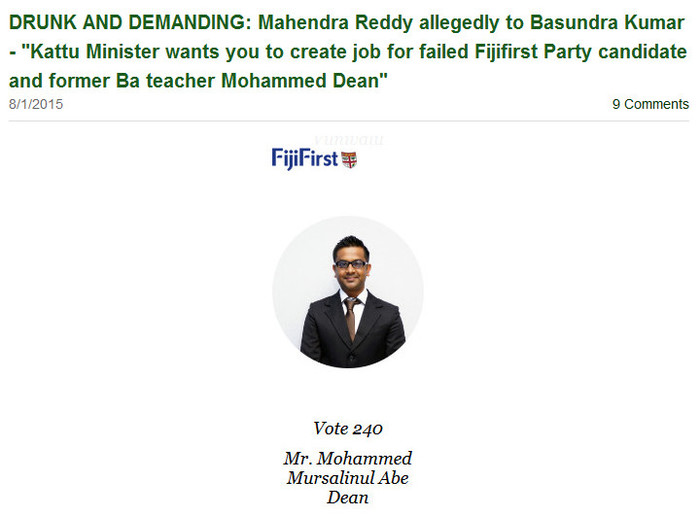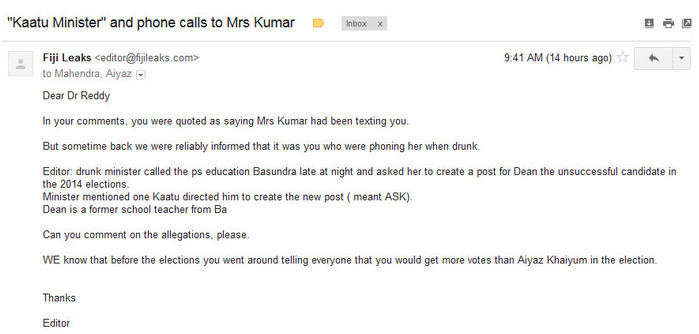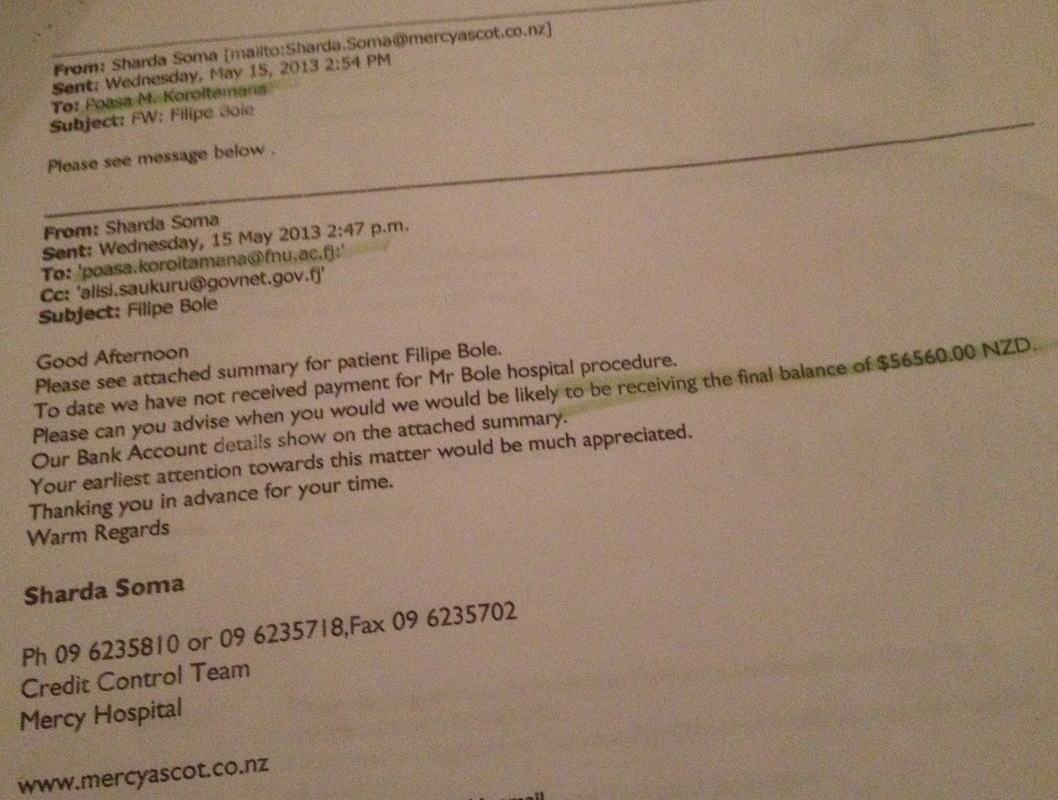After the election he was appointed as Divisional Education Officer, Western, based in Lautoka as per our previous story on "Kattu Minister"
THIS FFP LOSER DEAN GOT ONLY 589 VOTES, MOST LIKELY FROM FAMILY? Was Sanjit Patel PUSHED to make way for Khaiyum's chamcha DEAN to hide in Parliament of Fiji from MoE fraud investigators?
While we are on the topic of education, Fijileaks to Government: If Education Minister Reddy has condemned USP's MBA degree as "RUBBISH", why appoint Isikeli Tikoduadua, HFC CEO, as member of Commerce Commission; he is not only on Board of the MBA programme but also its graduate, so is PS, Defence, Cawarau, and many others. Parmesh Chand, PS, PSC, was a guest lecturer. If MBA is "rubbish", it might be because Reddy had become MBA lecturer at one point!
MOE confused on role of examinations in Fiji Education System: Fijileaks publishes the following Letters to the Editor which Fiji Times didn't run it
 Anaseini
Anaseini Kubuabola
Raivoce
This is in response to a Circular C55/15 from the Ministry of Education.
The Ministry of Education appears determined to be both confusing and confused with respect to the role of examinations within the Fiji Education System. This is provided in its recent circular (MOE-C55/15) to all School Heads, Divisional and District Offices dated 25/08/15 with the subject “Passing Point for All External Examinations”. (Fijileaks: See Circular below)
Having declared several years ago that examinations would be abolished, there appears to have been a concerted effort to see their reintroduction without sufficient thought having been given to the function that the reintroduced examinations will have.
The declaration that all students will progress automatically up to the end of Year 12, makes any suggestion of a “pass” in an examination irrelevant. But more seriously, the function that examinations in Year 6, 7, 8, 9, 10 and 11 will have needs to be made clear. It was suggested by the Minister that the information would be used by schools to inform parents of the progress/achievement of their children. In principle this sounds sensible, but if that information is restricted to a declaration of a “pass” or “otherwise”, or even to the actual raw mark awarded to the student in a particular subject, then the information carries little or no educational value. The real value would lie in identifying areas of strength and weakness shown by the student within the subject curriculum. Only when this has been done can appropriate steps be taken to correct the personal subject deficiencies of students. This may well involve providing support to teachers to improve their capacity to undertake remedial measures.
In the above mentioned circular the Ministry of Education has advised school heads on the manner by which assessment information gleaned from subject examinations will determine the “Passing Point”.
The first of the two recommendations from the “Scaling Review Report” holds true when attention is being given within the confines of a single subject. But the validity of the recommendation begins to fall apart once raw scores from an examination in one subject are compared with the raw scores from an examination in another subject. The claim that raw scores are ‘testimony of actual educational achievement level of each student in a given subject’ is far from the truth and indicates total ignorance of what a raw score is. A raw score is only ‘a number indicating the number of items a student answered correctly in a given test at a given point in time'. It has no bearing on the educational achievement (what the student can do or cannot do) of a student in the subject. It does not even reflect the knowledge and/or skills the student has acquired. Further, linking raw scores to educational achievement assumes that the test is 100% perfect (no test anywhere is 100% perfect in terms of what it measures). To be able to link educational achievement to test results, we need to find the true score which is the raw score plus or minus the standard error of measurement of the test.
The Ministry has attributed a score of 50 (presumably they mean a score of 50%) as the “Passing Point” to be adopted for each subject. There seems to be an assumption that 50% raw marks gained in one subject is equivalent to 50% raw marks gained in another subject. This simply is not true and is also misleading. Also using 50% as a pass in all subjects totally disregards the nature of the subject and the learning outcomes students are expected to achieve in each. Certain subjects pose greater demands on students than do other subjects. This difference in demand can be traced back to the curriculum expectations made clear for each subject.
The removing of a scaling process which makes correction for difference between subjects (a process known as inter-subject scaling), will create a situation whereby subjects which historically having been found to have lower examination means (Mathematics, Physics, Chemistry), will no longer receive protection through the scaling process.
Where Passing Points for a National Examination which involves selecting the “Best X subjects” (eg for Year 13 (FY13CE) Pass or score 50 or above in English and a Pass or score of 50 or above in any Best 3 subjects), there is a requirement to conflate scores between subjects.Conflation of scores involves adding the percentage score from one subject to the percentage score from other subjects. In the past the 250 score required from the Year 13 Examination, was based upon the conflation of standardized scores which ironed out differences between subjects.With the shift to raw scores, and a reduced conflated aggregate of 200, there is absolutely no assurance that the scores being conflated possess the same “exchange rate”.
How many officers from the Ministry of Education, would take 50 USD or a 50 AUD note and accept 50 FJD from the bank in return? Answer, none of them. So why is it so difficult to understand that what is being proposed by the Ministry of Education is simply an analogy of that situation?
I should in fairness mention that there are countries which have adopted raw marks for National Examinations, but only after a long and often painful process of building examiner expertise across all subjects.
This system will advantage those taking traditionally easy subjects as they are likely to get good scores from them compared to those who will opt for the more demanding subjects. This will be reflected in those that will be awarded scholarships at the end.
Fiji, be prepared for some surprising results, with respective winners and losers amongst the students, but not necessarily fairness.
Anaseini Kubuabola Raivoce
66 Salato Road
Namadi Heights.









